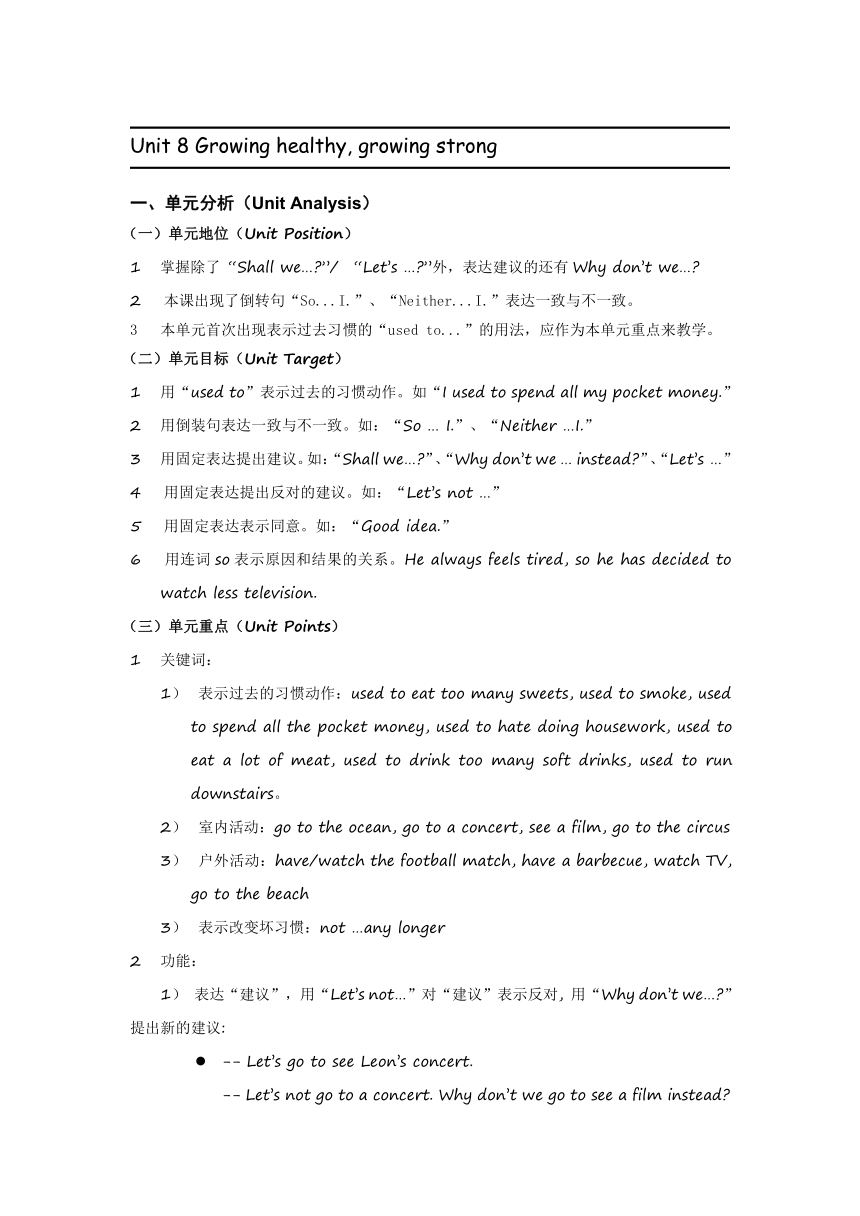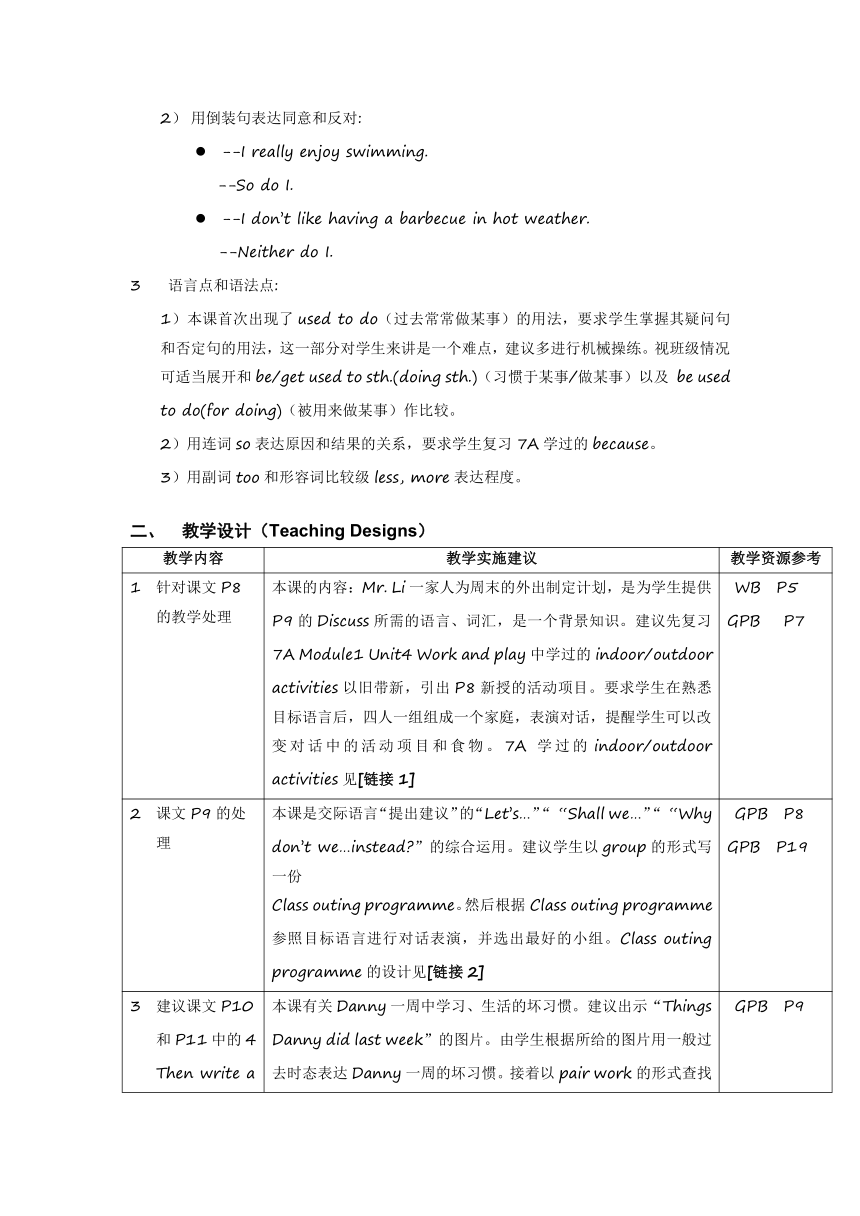Module 3 Diet and health Unit 8 Growing healthy,growing 教案
文档属性
| 名称 | Module 3 Diet and health Unit 8 Growing healthy,growing 教案 |

|
|
| 格式 | zip | ||
| 文件大小 | 1.8MB | ||
| 资源类型 | 教案 | ||
| 版本资源 | 牛津上海版(试用本) | ||
| 科目 | 英语 | ||
| 更新时间 | 2015-12-24 00:00:00 | ||
图片预览




文档简介
Unit 8 Growing healthy, growing strong
一、单元分析(Unit Analysis)
(一)单元地位(Unit Position)
1 掌握除了 “Shall we… ”/ “Let’s … ”外,表达建议的还有Why don’t we…
2 本课出现了倒转句“So...I.”、“Neither...I.”表达一致与不一致。
3 本单元首次出现表示过去习惯的“used to...”的用法,应作为本单元重点来教学。
(二)单元目标(Unit Target)
1 用“used to”表示过去的习惯动作。如“I used to spend all my pocket money.”
2 用倒装句表达一致与不一致。如:“So … I.”、“Neither …I.”
3 用固定表达提出建议。如:“Shall we… ”、“Why don’t we … instead ”、“Let’s …”
4 用固定表达提出反对的建议。如:“Let’s not …”
5 用固定表达表示同意。如:“Good idea.”
6 用连词so表示原因和结果的关系。 ( http: / / www.21cnjy.com )He always feels tired, so he has decided to watch less television.
(三)单元重点(Unit Points)
1 关键词:
1) 表示过去的习惯动作:used to ( http: / / www.21cnjy.com ) eat too many sweets, used to smoke, used to spend all the pocket money, used to hate doing housework, used to eat a lot of meat, used to drink too many soft drinks, used to run downstairs。
2) 室内活动:go to the oc ( http: / / www.21cnjy.com )ean, go to a concert, see a film, go to the circus
3) 户外活动:have ( http: / / www.21cnjy.com )/watch the football match, have a barbecue, watch TV, go to the beach
3) 表示改变坏习惯:not …any longer
2 功能:
1) 表达“建议”,用“Let’s not…”对“建议”表示反对, 用“Why don’t we… ”提出新的建议:
-- Let’s go to see Leon’s concert.
-- Let’s not go to a concert. Why don’t we go to see a film instead
2) 用倒装句表达同意和反对:
--I really enjoy swimming.
--So do I.
--I don’t like having a barbecue in hot weather.
--Neither do I.
3 语言点和语法点:
1)本课首次出现了used to do ( http: / / www.21cnjy.com )(过去常常做某事)的用法,要求学生掌握其疑问句和否定句的用法,这一部分对学生来讲是一个难点,建议多进行机械操练。视班级情况可适当展开和be/get used to sth.(doing sth.)(习惯于某事/做某事)以及 be used to do(for doing)(被用来做某事)作比较。
2)用连词so表达原因和结果的关系,要求学生复习7A学过的because。
3)用副词too和形容词比较级less, more表达程度。
教学设计(Teaching Designs)
教学内容 教学实施建议 教学资源参考
针对课文P8的教学处理 本课的内容:Mr. Li一家人为周 ( http: / / www.21cnjy.com )末的外出制定计划,是为学生提供P9的Discuss所需的语言、词汇,是一个背景知识。建议先复习7A Module1 Unit4 Work and play中学过的indoor/outdoor activities以旧带新,引出P8新授的活动项目。要求学生在熟悉目标语言后,四人一组组成一个家庭,表演对话,提醒学生可以改变对话中的活动项目和食物。7A 学过的indoor/outdoor activities见[链接1] WB P5GPB P7
课文P9的处理 本课是交际语言“提出建议”的“Le ( http: / / www.21cnjy.com )t’s…”“ “Shall we…”“ “Why don’t we…instead ”的综合运用。建议学生以group的形式写一份Class outing programme。然后根据Class outing programme参照目标语言进行对话表演,并选出最好的小组。Class outing programme的设计见[链接2] GPB P8GPB P19
建议课文P10和P11中的4 Then write a short report.作为一个课时 本课有关Danny一周中学 ( http: / / www.21cnjy.com )习、生活的坏习惯。建议出示“Things Danny did last week”的图片。由学生根据所给的图片用一般过去时态表达Danny一周的坏习惯。接着以pair work的形式查找引起Danny身体不适的原因,填写P11的报告。由此巩固复习一组表示程度的形容词和副词(too many, too much, not enough, too little)并学习for too long的用法。最后建议以group work的形式选择小组或班级中一个有坏习惯的同学,帮他(她)写一份坏习惯的报告(这两份报告是下一教时的准备)。Danny一周学习、生活坏习惯的图片见[链接3] GPB P9
课文P11的教学建议 本页的内容是上一教时的后 ( http: / / www.21cnjy.com )续部分,用一般将来时讨论Danny将会怎样做使自己变得健康(穿插让上一教时提出的有坏习惯的学生也用一般将来时表达自己的决心)。学会运用too many/too much的反义词less, not enough/too little的反义词组more;学会用Why has Danny decided to … 回答由so引导的表示原因和结果的表达。 WB P6(,so I have decided to..的练习)
课文P12和P13的处理建议 12和13页的内容直接相关,因此建议放 ( http: / / www.21cnjy.com )在同一教时。本课的内容集中出现了used to do的用法以及not…any longer的句式。建议先让学生用一般过去时表达Danny以前的坏习惯,如:Danny played computer games very often.等。由老师印出He doesn’t play computer games any longer. 再回过去用used to 表达He used to play computer games , but now he doesn’t play computer games any longer.然后采用造句的形式学习课文的内容,并运用used to拓展操练日常生活中自己或周围人已经改正了的坏习惯。关于这一内容的具体板书建议见[链接4]。 WB P7,8GPB P10可以布置一份课外调查,作为课堂教学的延伸。见[链接5]
[链接1]
说明: 在新授课文第8页的内容前,先复 ( http: / / www.21cnjy.com )习在7A中学过的下列室内、户外活动,为目标对话作铺垫,也为下一课时的制作海报 “制定外出计划”作准备。
Indoor activities Outdoor activities
doing a puzzle playing basketball
playing the piano fishing
reading a book playing tennis
playing computer games swimming
going to see a film going on a picnic
playing tennis making a model
swimming
collecting stamps
[链接2]
说明:建议教师在课前准备好下列形式 ( http: / / www.21cnjy.com )的海报若干份,要求学生以group的形式制作海报,然后根据海报内容进行目标语言的操练。课后将海报展示在教室的墙上。
Date:
Place:
Activities:
Food:
Drinks:
[链接3]
说明:根据下列图片用一般过去时态表达Danny一周的学习、生活坏习惯。
( http: / / www.21cnjy.com )
[链接4]
说明:由学生熟悉的Danny过去的坏习惯 ( http: / / www.21cnjy.com )引出used to do 的用法以及not…any longer的用法。以下提供教师板书示例一份,仅供参考。
Danny
in the past now
He played computer ( http: / / www.21cnjy.com )games very often. He doesn’t play computer games very often.
used to play
He often ate to ( http: / / www.21cnjy.com )o much pizza and ice-cream. He doesn’t eat too much pizza or ice-cream
used to eat any longer.
He often watched to ( http: / / www.21cnjy.com )o much television. He doesn’t watch too much television.
used to watch
He often did less exercise. He does more exercise.
used to do
He often did too litt ( http: / / www.21cnjy.com )le revision. He does more revision.
used to do
He often drank ( http: / / www.21cnjy.com ) too many soft drinks. He doesn’t drink too many soft drinks any
used to drink longer.
He often ate too ma ( http: / / www.21cnjy.com )ny sweets. He doesn’t eat too many sweets any longer.
used to eat
利用Danny坏习惯的转变引出used to do 的用法后,根据下列表格让学生造句,表格中的内容即课文12页的内容。
Name Things he/she used to do Things he/she doesn’t do/do now
Miss Guo Eat too many sweets Not eat too many sweets any longer
Kitty Spend all her pocket money Have started to save some money
Alice Eat a lot of meat Eat some meat and a lot of vegetables
Eddie Drink too many soft drinks Drink a lot of water and some fruit juice
Wendy Run downstairs at school Walk downstairs
Peter Hate doing housework Sometimes help his mother with the housework
Mr. Chen smoke Not smoke any longer
[链接5]
说明:要求学生对身边的同学、亲友作一份关于他们过去的坏习惯以及改正情况的调查报告,然后在课堂上陈述。
Name Things he/she used to do Things he/she doesn’t do/do now
一、单元分析(Unit Analysis)
(一)单元地位(Unit Position)
1 掌握除了 “Shall we… ”/ “Let’s … ”外,表达建议的还有Why don’t we…
2 本课出现了倒转句“So...I.”、“Neither...I.”表达一致与不一致。
3 本单元首次出现表示过去习惯的“used to...”的用法,应作为本单元重点来教学。
(二)单元目标(Unit Target)
1 用“used to”表示过去的习惯动作。如“I used to spend all my pocket money.”
2 用倒装句表达一致与不一致。如:“So … I.”、“Neither …I.”
3 用固定表达提出建议。如:“Shall we… ”、“Why don’t we … instead ”、“Let’s …”
4 用固定表达提出反对的建议。如:“Let’s not …”
5 用固定表达表示同意。如:“Good idea.”
6 用连词so表示原因和结果的关系。 ( http: / / www.21cnjy.com )He always feels tired, so he has decided to watch less television.
(三)单元重点(Unit Points)
1 关键词:
1) 表示过去的习惯动作:used to ( http: / / www.21cnjy.com ) eat too many sweets, used to smoke, used to spend all the pocket money, used to hate doing housework, used to eat a lot of meat, used to drink too many soft drinks, used to run downstairs。
2) 室内活动:go to the oc ( http: / / www.21cnjy.com )ean, go to a concert, see a film, go to the circus
3) 户外活动:have ( http: / / www.21cnjy.com )/watch the football match, have a barbecue, watch TV, go to the beach
3) 表示改变坏习惯:not …any longer
2 功能:
1) 表达“建议”,用“Let’s not…”对“建议”表示反对, 用“Why don’t we… ”提出新的建议:
-- Let’s go to see Leon’s concert.
-- Let’s not go to a concert. Why don’t we go to see a film instead
2) 用倒装句表达同意和反对:
--I really enjoy swimming.
--So do I.
--I don’t like having a barbecue in hot weather.
--Neither do I.
3 语言点和语法点:
1)本课首次出现了used to do ( http: / / www.21cnjy.com )(过去常常做某事)的用法,要求学生掌握其疑问句和否定句的用法,这一部分对学生来讲是一个难点,建议多进行机械操练。视班级情况可适当展开和be/get used to sth.(doing sth.)(习惯于某事/做某事)以及 be used to do(for doing)(被用来做某事)作比较。
2)用连词so表达原因和结果的关系,要求学生复习7A学过的because。
3)用副词too和形容词比较级less, more表达程度。
教学设计(Teaching Designs)
教学内容 教学实施建议 教学资源参考
针对课文P8的教学处理 本课的内容:Mr. Li一家人为周 ( http: / / www.21cnjy.com )末的外出制定计划,是为学生提供P9的Discuss所需的语言、词汇,是一个背景知识。建议先复习7A Module1 Unit4 Work and play中学过的indoor/outdoor activities以旧带新,引出P8新授的活动项目。要求学生在熟悉目标语言后,四人一组组成一个家庭,表演对话,提醒学生可以改变对话中的活动项目和食物。7A 学过的indoor/outdoor activities见[链接1] WB P5GPB P7
课文P9的处理 本课是交际语言“提出建议”的“Le ( http: / / www.21cnjy.com )t’s…”“ “Shall we…”“ “Why don’t we…instead ”的综合运用。建议学生以group的形式写一份Class outing programme。然后根据Class outing programme参照目标语言进行对话表演,并选出最好的小组。Class outing programme的设计见[链接2] GPB P8GPB P19
建议课文P10和P11中的4 Then write a short report.作为一个课时 本课有关Danny一周中学 ( http: / / www.21cnjy.com )习、生活的坏习惯。建议出示“Things Danny did last week”的图片。由学生根据所给的图片用一般过去时态表达Danny一周的坏习惯。接着以pair work的形式查找引起Danny身体不适的原因,填写P11的报告。由此巩固复习一组表示程度的形容词和副词(too many, too much, not enough, too little)并学习for too long的用法。最后建议以group work的形式选择小组或班级中一个有坏习惯的同学,帮他(她)写一份坏习惯的报告(这两份报告是下一教时的准备)。Danny一周学习、生活坏习惯的图片见[链接3] GPB P9
课文P11的教学建议 本页的内容是上一教时的后 ( http: / / www.21cnjy.com )续部分,用一般将来时讨论Danny将会怎样做使自己变得健康(穿插让上一教时提出的有坏习惯的学生也用一般将来时表达自己的决心)。学会运用too many/too much的反义词less, not enough/too little的反义词组more;学会用Why has Danny decided to … 回答由so引导的表示原因和结果的表达。 WB P6(,so I have decided to..的练习)
课文P12和P13的处理建议 12和13页的内容直接相关,因此建议放 ( http: / / www.21cnjy.com )在同一教时。本课的内容集中出现了used to do的用法以及not…any longer的句式。建议先让学生用一般过去时表达Danny以前的坏习惯,如:Danny played computer games very often.等。由老师印出He doesn’t play computer games any longer. 再回过去用used to 表达He used to play computer games , but now he doesn’t play computer games any longer.然后采用造句的形式学习课文的内容,并运用used to拓展操练日常生活中自己或周围人已经改正了的坏习惯。关于这一内容的具体板书建议见[链接4]。 WB P7,8GPB P10可以布置一份课外调查,作为课堂教学的延伸。见[链接5]
[链接1]
说明: 在新授课文第8页的内容前,先复 ( http: / / www.21cnjy.com )习在7A中学过的下列室内、户外活动,为目标对话作铺垫,也为下一课时的制作海报 “制定外出计划”作准备。
Indoor activities Outdoor activities
doing a puzzle playing basketball
playing the piano fishing
reading a book playing tennis
playing computer games swimming
going to see a film going on a picnic
playing tennis making a model
swimming
collecting stamps
[链接2]
说明:建议教师在课前准备好下列形式 ( http: / / www.21cnjy.com )的海报若干份,要求学生以group的形式制作海报,然后根据海报内容进行目标语言的操练。课后将海报展示在教室的墙上。
Date:
Place:
Activities:
Food:
Drinks:
[链接3]
说明:根据下列图片用一般过去时态表达Danny一周的学习、生活坏习惯。
( http: / / www.21cnjy.com )
[链接4]
说明:由学生熟悉的Danny过去的坏习惯 ( http: / / www.21cnjy.com )引出used to do 的用法以及not…any longer的用法。以下提供教师板书示例一份,仅供参考。
Danny
in the past now
He played computer ( http: / / www.21cnjy.com )games very often. He doesn’t play computer games very often.
used to play
He often ate to ( http: / / www.21cnjy.com )o much pizza and ice-cream. He doesn’t eat too much pizza or ice-cream
used to eat any longer.
He often watched to ( http: / / www.21cnjy.com )o much television. He doesn’t watch too much television.
used to watch
He often did less exercise. He does more exercise.
used to do
He often did too litt ( http: / / www.21cnjy.com )le revision. He does more revision.
used to do
He often drank ( http: / / www.21cnjy.com ) too many soft drinks. He doesn’t drink too many soft drinks any
used to drink longer.
He often ate too ma ( http: / / www.21cnjy.com )ny sweets. He doesn’t eat too many sweets any longer.
used to eat
利用Danny坏习惯的转变引出used to do 的用法后,根据下列表格让学生造句,表格中的内容即课文12页的内容。
Name Things he/she used to do Things he/she doesn’t do/do now
Miss Guo Eat too many sweets Not eat too many sweets any longer
Kitty Spend all her pocket money Have started to save some money
Alice Eat a lot of meat Eat some meat and a lot of vegetables
Eddie Drink too many soft drinks Drink a lot of water and some fruit juice
Wendy Run downstairs at school Walk downstairs
Peter Hate doing housework Sometimes help his mother with the housework
Mr. Chen smoke Not smoke any longer
[链接5]
说明:要求学生对身边的同学、亲友作一份关于他们过去的坏习惯以及改正情况的调查报告,然后在课堂上陈述。
Name Things he/she used to do Things he/she doesn’t do/do now
同课章节目录
- Module 1 Relationships
- Unit 1 Relationships in beijing
- Unit 2 Our animal friends
- Unit 3 Friends from other countries
- Module 2 My Neighborhood
- Unit 4 Jobs people do
- Unit 5 Choosing a new flat
- Unit 6 Different places
- Unit 7 Signs around us
- Module 3 Diet and health
- Unit 8 Growing healthy,growing
- Unit 9 International Food Festival
- Unit 10 A birthday party
- Unit 11 My food project
